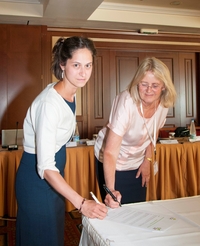PDF for print (249,5 KB)
The 15th meeting of the Steering Committee of the European Cooperative Programme for Plant Genetic Resources (ECPGR) took place 15-17 May 2018 in Thessaloniki, Greece, with the local support of HAO-DEMETER and of the Greek Ministry of Rural Development and Food. National Coordinators from 33 member countries gathered to review progress made by the Programme during its Phase IX (2014-2018) and to define plans for a new Phase X (2019-2023). Observers from Bioversity International, FAO International Treaty on PGRFA, the European Seed Association (ESA), the European Association for Research on Plant Breeding (EUCARPIA), the Nordic Genetic Resource Centre (Nordgen), a representative of international NGOs and the local hosts also contributed to enrich the meeting.
Background documents summarizing the results of the past five years were prepared in advance for the delegates and were made available on the ECPGR website, including reports from the Secretariat, the Executive Committee and the Working Group Chairs. One highlight of Phase IX was the consolidation of the AEGIS European Collection across 34 countries with 62 member institutions including ca. 34 000 unique accessions to be maintained at high standards and available for distribution under the terms defined by the International Treaty on PGRFA. This result was considered positive, but the growth of the European Collection was much slower than expected. Therefore, a workshop to investigate the reasons for slow progress and to find solutions and incentives for a wider participation in AEGIS was planned for the end of the year 2018.
EURISCO, the European catalogue of ex situ accessions, was managed during Phase IX by IPK in Gatersleben, Germany. The opening of EURISCO in 2017 to the inclusion of characterization and evaluation was a progress milestone. In situ conservation of crop wild relatives and on-farm conservation and management benefited from the endorsement by the Steering Committee of the respective concepts in 2015 and 2017, prepared by dedicated task forces.
In order to improve the sustainable use of genetic resources, a project funded by Germany aimed to help creating better opportunities to establish private/public partnerships for evaluation of genetic resources stored in European genebanks. This initiative culminated with the establishment of the framework for a European Evaluation Network (EVA), which was approved during the meeting. This framework is expected to catalyze future partnerships for multi-site evaluations across Europe and thus generate new data to be made available from EURISCO. Support for the involvement of the private seed sector in the newly framed EVA came from ESA with the agreement to sign a Memorandum of Understanding, aiming for enhanced cooperation with ECPGR.
During the past five years, the ECPGR Activity Grant Scheme enabled the ECPGR Working Groups to carry out 28 funded activities, contributing to the ECPGR goal to conserve PGRFA ex situ and in situ and to increase their utilization.
The objectives of ECPGR for Phase X were slightly revised, but still focusing on ex situ and in situ conservation, documentation and sustainable use of PGRFA. The mode of operation of ECPGR will still be based on a Grant Scheme that will assign funds for activities on the basis of calls for proposals. More opportunities for meetings for each Working Group will also be guaranteed. A revision of the operating structure, with the possibility to widen the scope of the Working Groups to crops that were so far excluded, such as maize and small fruits/berries, was called for and will need to be agreed upon before the end of 2018.
The need for better communication of the achievements of ECPGR and of the importance of crop genetic resources to policy-makers, PGR users, the scientific community and the general public was stressed. A draft strategy was extensively discussed and is expected to be finalized soon. The development of products such as an ECPGR 40-year jubilee video was recommended, and suitable external funds should be sought.
A presentation by the FAO Treaty representative informed the participants about progress of the International Treaty implementation and specifically about the latest developments of the Global Information System with the opportunity to assign Digital Object Identifiers (DOIs) to genebank accessions. Such development will facilitate access to information, improve data quality, interconnect information generated by genebanks and users, etc. The Steering Committee recommended that the European genebanks adopt the use of DOIs and the EURISCO Coordinator offered help for the registration procedure.
A continuation of the Programme for a new 5-years Phase (2019-2023) was approved by the National Coordinators, including a budget set at € 537 650 per year from regular contributions. Hosting arrangements of the Secretariat and EURISCO were reconfirmed to be respectively assigned to Bioversity International in Maccarese, Italy, and to IPK in Gatersleben, Germany.
The excellent organization of the meeting arrangements and hospitable atmosphere that the SC experienced during its stay in Thessaloniki helped to make this meeting a milestone for future collaboration on PGRFA in Europe.
May 2018

